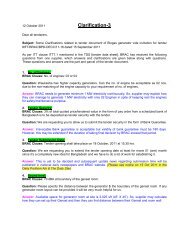Combining health and social protection measures to reach the ultra ...
Combining health and social protection measures to reach the ultra ...
Combining health and social protection measures to reach the ultra ...
- No tags were found...
You also want an ePaper? Increase the reach of your titles
YUMPU automatically turns print PDFs into web optimized ePapers that Google loves.
Research resourcesThe threat of p<strong>and</strong>emics from new <strong>and</strong> emerging diseasessuch as <strong>the</strong> severe acute respira<strong>to</strong>ry syndrome (SARS) <strong>and</strong>avian influenza (AI), as well as widespread natural disastershas dem<strong>and</strong>ed <strong>the</strong> rapid development of global alert <strong>and</strong>response systems as well as basic <strong>and</strong> clinical research rightat <strong>the</strong> core of <strong>the</strong>se affected countries. Bioterrorism also has<strong>the</strong> potential <strong>to</strong> modify a country’s research priorities <strong>and</strong>resources. Situations such as milk supplies <strong>and</strong> botulinum<strong>to</strong>xin, smallpox <strong>and</strong> self-infected terrorists, <strong>and</strong> release ofaerosolized microbes in closed environments are newproblems that need previously untaught <strong>to</strong>ols <strong>and</strong> skills.The growing burden of disease from injuries <strong>and</strong> violenceas well as mental <strong>and</strong> neurological diseases must also berecognized. Likewise, cross-cutting issues of equity,particularly gender-related issues, <strong>and</strong> intersec<strong>to</strong>ral concernslike environmental <strong>health</strong> <strong>and</strong> global warming, have grown inimportance through <strong>the</strong> years.All of <strong>the</strong> above developments require RCS, wherescientists <strong>and</strong> public <strong>health</strong> officers will be asked <strong>to</strong> leadneeds assessments, develop new <strong>to</strong>ols <strong>and</strong> interventions <strong>and</strong>work with policy-makers. Without coordinated research <strong>and</strong>programmatic action, <strong>health</strong> systems <strong>and</strong> <strong>the</strong> <strong>health</strong> of <strong>the</strong>people in many LMICs are bound <strong>to</strong> deteriorate even fur<strong>the</strong>r.Brain drainIn 2005, <strong>the</strong> Joint Learning Initiative, a group of more than100 scientists, called <strong>the</strong> world’s attention <strong>to</strong> <strong>the</strong> dire crisis in<strong>the</strong> <strong>health</strong> workforce, especially in LMICs. The World HealthReport 2006: Working <strong>to</strong>ge<strong>the</strong>r for Health also focused on<strong>the</strong> global human resources for <strong>health</strong> <strong>and</strong> proposed a 10-year action plan for addressing this challenge, both in <strong>the</strong>public <strong>and</strong> private sec<strong>to</strong>rs. Far less aired but also a significantproblem is <strong>the</strong> chronic lack of skilled <strong>health</strong> researchers inmany LMICs due <strong>to</strong> intra- <strong>and</strong> international migration.Many of <strong>the</strong> root causes are similar <strong>to</strong> those of <strong>the</strong> general<strong>health</strong> workforce, such as <strong>the</strong> quest for state-of-<strong>the</strong>-arttechnologies, better socio-political conditions, <strong>and</strong> improvedrevenue <strong>and</strong> quality of life. Among researchers, <strong>the</strong> situationis compounded by <strong>the</strong> lack of a nationally coordinated careerpath for researchers <strong>and</strong> an enabling research environment.It is critical for LMICs <strong>to</strong> achieve <strong>and</strong> sustain <strong>the</strong> minimumknowledge-based mass needed for creativity, credibility <strong>and</strong>innovation in <strong>health</strong> <strong>and</strong> development. The vigorous call <strong>to</strong>action for building <strong>and</strong> retaining <strong>the</strong> <strong>health</strong> workforce inLMICs must also include strategic action for RCS.Recent research developmentsNew research streams <strong>and</strong> technologies require constantsharpening of research skills or developing new cadres ofscientists, refining old methods or developing new researchapproaches, <strong>and</strong> arranging innovative partnerships. There aretremendous research challenges related <strong>to</strong> <strong>the</strong> attainment of<strong>the</strong> MDGs, <strong>the</strong> reduction of poverty, inequities <strong>and</strong> o<strong>the</strong>r<strong>social</strong> determinants of ill <strong>health</strong>, but insufficient numbers oftrained professionals <strong>to</strong> carry out <strong>health</strong> policy <strong>and</strong> systemsas well as <strong>health</strong> <strong>social</strong> science research. The attention <strong>to</strong> <strong>the</strong>“know – do” gap in recent years underscores <strong>the</strong> importanceof considering o<strong>the</strong>r stakeholders as essential players inWithout coordinated research <strong>and</strong> programmaticaction, <strong>health</strong> systems <strong>and</strong> <strong>the</strong> <strong>health</strong> of <strong>the</strong> people inmany LMICs are bound <strong>to</strong> deteriorate even fur<strong>the</strong>rresearch formulation, implementation <strong>and</strong> translation <strong>to</strong>policy <strong>and</strong> action.The revolutions in science <strong>and</strong> technology – frominformation <strong>and</strong> communication technology, <strong>to</strong> genomics,proteomics <strong>and</strong> nanotechnology – present new opportunitiesfor North–South <strong>and</strong> South–South research partnerships forimproving access <strong>to</strong> much-needed drugs <strong>and</strong> <strong>to</strong>ols. On <strong>the</strong>o<strong>the</strong>r h<strong>and</strong>, <strong>the</strong>y pose dilemmas in <strong>the</strong> realm of researchethics, intellectual property <strong>and</strong> equity – all of which national<strong>health</strong> research systems must be prepared <strong>to</strong> confront.The growing emphasis on performance-based funding, <strong>the</strong>need <strong>to</strong> track progress <strong>to</strong>wards <strong>the</strong> MDGs <strong>and</strong> <strong>the</strong>complexities of decentralized reporting in devolved <strong>health</strong>systems agencies have necessitated a fresh look at <strong>health</strong>information systems <strong>and</strong> streng<strong>the</strong>ned competencies atcountry levels <strong>to</strong> generate reliable <strong>and</strong> accurate <strong>health</strong>statistics. The explosion of information <strong>and</strong> knowledge hasalso generated global interest in knowledge management <strong>and</strong><strong>the</strong> syn<strong>the</strong>sis, dissemination <strong>and</strong> translation of <strong>the</strong> bestavailable evidence for <strong>health</strong> policy <strong>and</strong> practice.GlobalizationThis phenomenon is not new, but <strong>the</strong> rapid changes inscience, communication <strong>and</strong> technology frontiers, newinternational trade <strong>and</strong> market regulations, macroeconomics<strong>and</strong> <strong>the</strong> environment have heightened <strong>the</strong> impact ofglobalization more than ever before. Overall, it has had adeleterious effect on <strong>health</strong> care systems in developingcountries, affecting not only <strong>the</strong> migration of <strong>health</strong> humanresources, but also <strong>the</strong> capacity <strong>to</strong> deal with emergingdiseases, bioterrorism <strong>and</strong> biased <strong>health</strong> sec<strong>to</strong>r markets.LMICs need <strong>to</strong> build <strong>the</strong>ir capacity <strong>to</strong> define <strong>and</strong> pursueglobalization-related research that can reduce inequities in<strong>health</strong> <strong>and</strong> knowledge capacities <strong>and</strong> that can streng<strong>the</strong>nregula<strong>to</strong>ry policies. Only <strong>the</strong>n can national <strong>health</strong> researchsystems derive maximum gain from <strong>the</strong> opportunities <strong>and</strong>threats from globalization 19,20 .Recent trends in RCSThe urgent <strong>and</strong> enormous need for research capacity <strong>to</strong>address <strong>the</strong> problems of LMICs <strong>and</strong> <strong>the</strong> poor has not goneunheeded. In addition <strong>to</strong> a number of existing <strong>and</strong> recentlyestablished initiatives that have RCS as a major strategicobjective, <strong>the</strong>re are numerous research initiatives that haveRCS streams integrated in<strong>to</strong> <strong>the</strong>ir respective activities. Apanoramic view of capacity streng<strong>the</strong>ning efforts <strong>and</strong> issueswas recently published by <strong>the</strong> Global Forum for HealthResearch according <strong>to</strong> <strong>the</strong> following parameters:✜ RCS levels: individual training, institutional development,organizational development, national <strong>health</strong> researchsystems, supranational <strong>health</strong> research bodies;124 ✜ Global Forum Update on Research for Health Volume 4



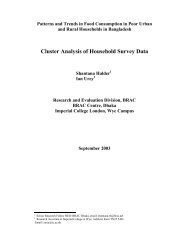
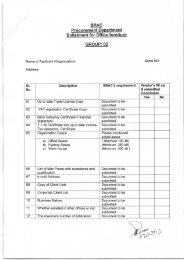
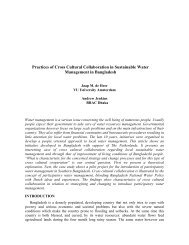
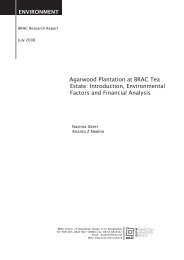
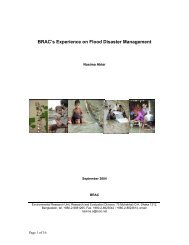
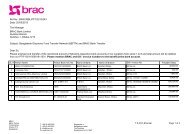
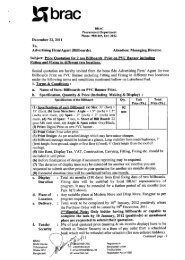
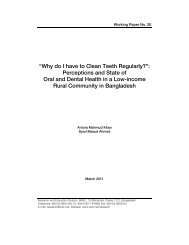
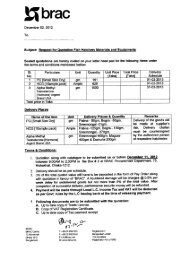

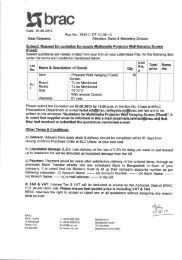
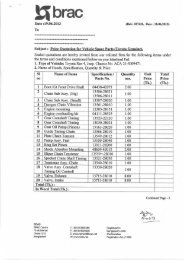
![[re-tender] RFQ for supply of Diesel Generator - Brac](https://img.yumpu.com/44421374/1/186x260/re-tender-rfq-for-supply-of-diesel-generator-brac.jpg?quality=85)
